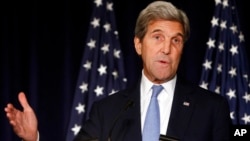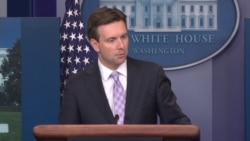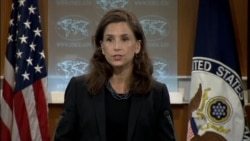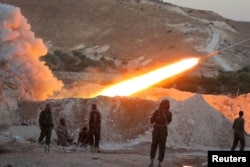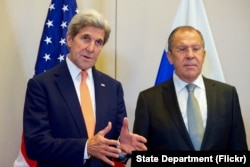Declaring its patience with Russia has run out, the United States on Monday suspended Syria cease-fire talks with Moscow, citing continued military attacks against civilian targets in the war-torn Middle Eastern country.
"This is not a decision that was taken lightly," U.S. State Department spokesman John Kirby said in a statement. Though Washington "spared no effort" in trying to implement the cessation of hostilities, Russia "failed to live up to its own commitments," Kirby said.
"[Russia] was also either unwilling or unable to ensure Syrian regime adherence to which Moscow had agreed," the statement said. "Rather, Russia and the Syrian regime have chosen to pursue a military course."
WATCH : White House Press Secretary Josh Earnest on Russia
Russia's Ambassador to the United Nations, Vitaly Churkin, said, "Had it not been for our involvement in Syria, it might well be that the black flags [of Islamic State] would be flying over Damascus. It could well be. This is the reality of the situation."
He said that while Russia regretted the civilian casualties, "This is where it stands. [The] situation has been allowed to degenerate into this awful, awful mess and we are trying to find a way out of it and trying to make sure that the black flags are not going to fly over Damascus."
Though the talks are suspended, the U.S. will continue to use a communications channel with Russia to reduce the possibility of conflicting counterterrorism operations in Syria, the statement said.
Moscow has provided military support to and conducted airstrikes in support of the government of Syrian President Bashar al-Assad, while Washington has supported some of the rebel groups fighting to oust the Syrian president.
WATCH: State Dept.Press Office Dir. Trudeau on suspended channels
Previous cease-fire
The two sides agreed to a cease-fire last month to reduce violence, provide humanitarian access and degrade terrorist groups. But the deal quickly broke down, with each side blaming the other. Subsequent talks failed to resolve the impasse.
“What's clear is that there is nothing more for the U.S. and Russia to talk about with regard to trying to reach an agreement that would reduce the violence inside of Syria,” said White House Press Secretary Josh Earnest. “And that is tragic.”
Moscow says it regrets the U.S. move to suspend the talks. A Russian foreign ministry spokeswoman quoted by local news agencies said Washington is trying to shift blame for not living up to its end of the deal.
But Earnest disagreed: "Everybody's patience with Russia has run out."
Mark Katz, professor at George Mason University, told VOA, "I think the only surprise is that it took so long. It's been clear from mid-September that the cease-fire wasn't going anywhere."
He blamed the outcome on the "tremendous mistrust between Moscow and Washington." He said that while the two sides managed to agree on the basics of the cease-fire, "there’s no overall agreement on the fate of Assad. Obviously, Washington calls for him to leave, but even though they [Russia] are not doing much to bring this about, that’s obviously too much for Moscow."
Too much mistrust
Katz said the mistrust between the two sides was so great they failed to work with each other. "They're essentially following the lead of the Assad regime, [and] the Assad regime just worked to scuttle the whole thing."
Katz agreed that the Obama administration was right in its decision. He said Washington had little choice after Moscow's silence over the continued airstrikes.
U.S. officials had repeatedly threatened to call off the talks unless Russia ended its bombing of the Syrian city of Aleppo. Tensions especially spiked after the Sept. 19 bombing of a United Nations aid convoy, which the U.S. blamed on Russia and Syria.
The U.S. move to pull out of the talks came hours after Russian President Vladimir Putin signed a decree Monday to suspend an agreement with the U.S. on disposing of weapons-grade plutonium, citing Washington's "unfriendly actions."
It also claimed the United States was unable "to ensure the implementation of its obligations to utilize surplus weapons-grade plutonium."
Earnest, the White House spokesman, said the U.S. was disappointed by Russia's decision to unilaterally pull out of the treaty.
The deal, initially signed in 2000 and renewed in 2010, called for both nuclear powers to dispose of weapons-grade plutonium from their defense programs.
Based on the 2010 agreement, signed by Russian Foreign Minister Sergei Lavrov and then-U.S. Secretary of State Hillary Clinton, each side would dispose of 34 metric tons of plutonium by burning it in nuclear reactors.
Clinton said that quantity was large enough to make almost 17,000 nuclear weapons.
US-Russia ties plunging
Russia and the United States viewed that deal as a sign of increased cooperation between them toward nuclear nonproliferation.
But ties between Moscow and Washington plunged to the lowest point since the Cold War when Russia annexed Crimea from Ukraine in 2014 and has supported pro-Moscow separatists in eastern Ukraine.
Ian Brzezinski of the Atlantic Council told VOA on Monday that the Kremlin's move is a signal to President Barack Obama that "U.S. efforts to curtail Moscow’s geopolitical ambitions will put at risk all constructive aspects of the bilateral relationship," including the New START treaty "agreement President Obama and his administration consider to be one of their signature foreign policy achievements."
The twin announcements Monday were the latest evidence of the deteriorated ties. But despite the timing, Elizabeth Trudeau, a State Department spokeswoman, said she does not see a link between the suspension of the plutonium deal and the Syrian talks.
"We believe it would be a shame if this important agreement was put aside because of unrelated issues," she said.
State Department correspondent Nike Ching, White House correspondent Mary Alice Salinas and Moscow correspondent Daniel Schearf, as well as William Gallo and Jesusemen Oni in Washington, contributed to this report.




